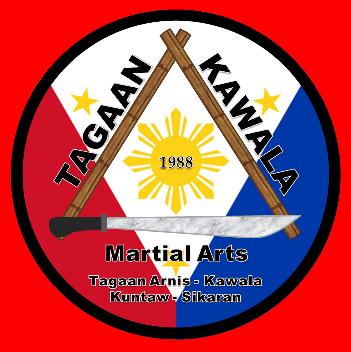
The Circle – signifies the circular movement of the practitioner – the hands, body, and feet are working on a principle of circular deflection and attack in an unarmed confrontation. The Circle also signifies the synergy of all principles of Tagaan-Kawala martial arts.
The Itak (bolo) – is uncompromisingly the foundation of Tagaan Arnis. We always regard that our weapon is bladed and that our opponent carries the same lethal weapon as we do. We do not use our hands to grab and arms to block our opponent’s weapon attack.
The Arnis (rattan batons) – signifies that although we use “arnis” for our training, we regard them as bladed weapons, and that we pay extra care when we use them. Arnis also symbolizes our human nature:
The lightness in weight = softness and kindness of heart, and slow to anger
The length of "arnis" = distance between ends means we maintain distance from trouble and keeping away from it
The nodes= as “arnis” breaks between nodes ("buko") it would take many nodes to break before the “arnis” becomes a closed-fight weapon. This signifies our level of discipline and control before we engage to a fight.
The hardness and strength of "arnis" = signifies that when we are “pushed to the wall”; we become “mandirigma” (warrior).
The Triangle (itak and arnis’ shape) – is the foundation of feet movements in an “armed” confrontation.
The TAGAAN and KAWALA – the “armed” and “unarmed” systems of Tagaan-Kawala Martial Arts
The Martial Arts– the FMA that are taught and propagated by GM Marc De Leon. Along with Tagaan Arnis and Kawala arts, students also learn and practise Kuntaw (IKF/KNP) and Sikaran (WSABP) martial arts. All students are also registered members of Kuntaw and Sikaran. Tagaan-Kawala is a complete arsenal of FMA’s world known martial arts styles.
The 1988– the year 1988 at the centre of the sun signifies the death of Great Master Marcial De Leon at the age of 98 years old. GM Marc De Leon becomes the heir of the art.
The Three Stars, the Sun, and the Red-White-Blue background – this proudly proclaims that Tagaan –Kawala Martial Arts is truly a Philippine art - a Filipino Martial Arts (FMA).
Mahinahon (English: Prudent) The practitioner must be prudent and is able to deprive himself of aggresiveness in a situation. Prudence must be the first reaction, otherwise, the purpose of learning the art is defeated. Prudence is a virtue that is a must in the study of Tagaan-Kawala. Though it cannot be learned overnight, constant practise builds a foundation and eventually becomes a way of life.
Matatag (English: Resolute) Unless the practitioner is resolute and firmly believes that what he fights for is righteous...that he has faith on his abilities...that what he would do is in the real meaning of self-defense, the purpose of using Tagaan-Kawala would be in vain. Winning the fight is not the measurement of a real triumph, but the motivation of going into it and his readiness to face whatever consequence his action may bring about both to himself and to his opponent.
Matapang (English: Valiant) The real valiantry is to avoid or evade a fight. The only acceptable reason where the self-defense skills is rightfully used, is when there is no other way to get out of a situation and the only option is to fight to survive, And, when it happens, the only rule that applies is..."thou shall survive."
These philosophies (Mahinahon, Matatag, Matapang) are in the heart of every Tagaan-Kawala practitioners and are integral in the way we train and the way we live as Tagaan-Kawala practitioners.
Copyright © 2010 Tagaan-Kawala M.A.
Back to Top
Website design by: GM Marc